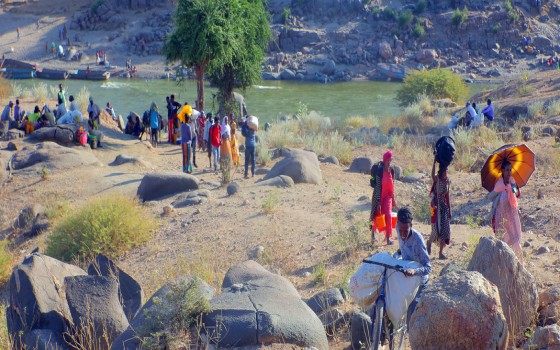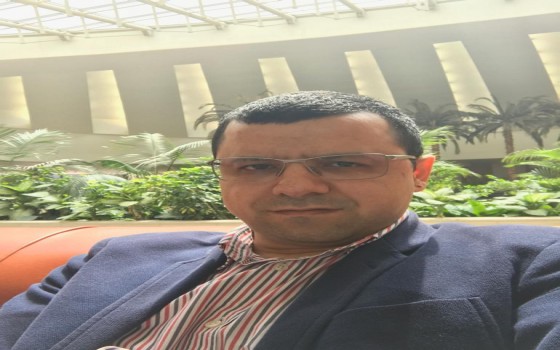
Samson's Choice and the End of the World... The Middle East in the Eye of the Storm... by Mustafa Kamal Al-Amir

- Europe and Arabs
- Monday , 23 June 2025 14:25 PM GMT
The spark of a major regional war erupted in the Middle East, the "rift," after decades of escalating tensions between Iran on the one hand, and Israel and the United States on the other. This has brought the region into a new and dangerous phase that portends radical changes in its political and geographical map.
Israel and the United States launched this war directly on Friday, June 13, 2025, in an unprecedented military escalation between Tel Aviv and Tehran, coordinated and explicitly supported by Washington.
Amid suspicious international silence and blatant regional complicity, this could lead to the war spreading to several Arab countries, amid a state of chaos and instability.
A week after the outbreak of the war, six American B-2 strategic bombers took off from their bases in Missouri to carry out concentrated strikes on Iranian nuclear targets fortified in the mountains, in an attempt to subjugate Tehran and break its will.
This is part of the "Samson Option" strategy that Israel has been threatening for decades: if we fall, everyone will fall with us.
Here, we warn against falling into the trap of fabricated images and information, especially those produced by AI technologies and promoted by propaganda campaigns aimed at misleading global public opinion.
Just as happened in the 1967 war, when misleading media led to a catastrophic setback.
At the same time, regional parties are seeking to exploit this conflict to serve their own interests. While the positions of Turkey, Iran's western neighbor, diverge,
nuclear-powered Pakistan is expressing its willingness to support and engage in confrontation,
changing the balance of power in an unprecedented manner.
Will China intervene and invade Taiwan and unify it with it?
Will America bargain with it in exchange for its silence on the attack on Iran?
While Russia abandons its ally Iran in exchange for settling its war with Ukraine?
The Israeli aggression against Iran brings to mind previous scenarios from the wars Israel fought in Gaza, Lebanon, and Syria.
However, Tehran's missiles have proven their ability to penetrate Israeli defenses, despite their advanced American systems,
which has prompted some Israeli leaders to take shelter in shelters and tunnels. At the same time, Arab and Islamic anger is growing as a result of the absolute Western support for Israel, which has not ceased even in the face of massacres committed against civilians in Gaza, Lebanon, Syria, and Yemen. Washington's "neo-colonial" power has become a mere military arm of Israel, employing its armies and fleets to achieve its biblical interests in the region. The irony is that America, which failed to learn the lessons of the September 11, 2001 attacks due to its blind support for Israel, continues, a quarter century later, to repeat its historical mistakes, wasting a real opportunity to achieve balance and just peace in the region by establishing a Palestinian state. As for the butcher Netanyahu, who boasted of waging a bloody war on seven fronts, he has now hit the wall of reality when he was surprised by Iran's strength on one front. Israel broke the axis of resistance within just months of Hezbollah in Lebanon and the overthrow of Bashar al-Assad's regime in Syria. Iran's back was exposed, and striking it and changing its regime became a matter of time. This catastrophic conflict brings to the fore many questions about the fate of the regimes in the region, and whether the monarchies that supported America and Israel against the Arab republics will remain unaffected by the repercussions of the Great Explosion. What is striking is that the world did not know these devastating wars in our countries before the establishment of the State of Israel in 1948, which was and remains the focus of all regional and international disputes and conflicts. Now, after the wars of America and Israel have led to the destruction of major Arab republics (Iraq, Syria, Libya, Sudan, and Yemen), the entire region is being redrawn anew.
Israel is putting its sword to everyone's throat.
The position of some Christian circles in the West, who support the Israeli-American aggression against Iran, raises many questions about the standards of justice and moral positions, especially when silence or support becomes selective, based on identity and interests.
The most important question remains: What would their position be if the same "axis of evil" directed its aggression against other Arab countries, especially Egypt?
Wouldn't the measure of solidarity change when the victim becomes a country with which they have a human, cultural, and religious connection?
Human relations between followers of the three Abrahamic monotheistic religions are going through a period of terrible historical imbalance.
While Islam recognizes both Christianity and Judaism as divine religions, many Christian and Jewish religious movements refuse to recognize Islam or its Prophet Muhammad, peace and blessings be upon him, despite the deep historical animosity that has united them since their persecution of the Virgin Mary. And her son, Jesus Christ, and their betrayal of him, despite his message of love and peace.
The irony is that the alliance of some Western religious and political forces with Israel, despite ideological differences, is mostly centered around political, not religious, goals. This raises the question: How did those who originally denied each other come together in a common enmity toward Muslims?
All this is happening at a time when humanity is divided between two major religions, Islam and Christianity, each with over two billion followers, while Jews constitute less than 1% of the world's population.
Despite this, their political and economic influence is enormous, particularly through alliances with major powers like the United States and Britain.
Your support for Iran in this war does not mean you are a Shiite.
However, your support for Israel cannot be separated from your support for Zionism, which has long practiced aggressive policies against the Palestinians and Arabs in general.
In the midst of this complex scene, we recall the Prophet Muhammad's ﷺ reaction to the defeat of the Romans at the hands of the Persians, as mentioned in Surat al-Rum, followed by God's promise to the believers of the Romans' victory. Later, this promise was fulfilled within "a few years," which carries a symbolic meaning that the scales shift, and that victory does not always belong to those who possess power alone.
As stated in the Holy Quran
"You will surely find the most intense of the people in animosity toward the believers to be the Jews and those who associate others with God. And you will surely find the nearest of them in affection to the believers to be those who say, "We are Christians.""
While the new American Pope, Pope Leo, called for calm after the US strikes on Iranian nuclear facilities, asserting that "humanity is crying out today and demanding peace," the political and military reality was moving in the opposite direction, with a dangerous escalation led by a reckless US administration and an expansionist Israeli vision. The current war does not appear limited in scope; rather, it portends a long-term continuation that extends beyond Iran's surrender or defeat.
The goal of Israel and its allies is to reshape the entire Middle East, politically and economically, by draining its resources and imposing hegemony over it, akin to collecting "tribute" in its modern sense.
Jewish money, represented by families like the Rothschilds, has succeeded in subjugating Western policies in favor of the establishment and protection of the State of Israel, at a time when the Arabs have relinquished their oil and wealth without compensation, and their resources have been controlled without a true awareness of the dangers of the alliances that shape the region's map.
After the destruction of numerous Arab republics, from Iraq to Libya, Syria, Yemen, and Sudan, attention is turning to the future of the Arab monarchies: Will they remain allies and subject to Western influence, or will they, too, be on the list of division and targeting if the balance of power shifts?
The United States, led by the Trump administration, is seeking to collect the "spoils of war" from its own allies, from Saudi Arabia, Qatar, and the UAE, to Ukraine, Iraq, and Kuwait, which previously paid the price for their liberation. The question today is: Who will be next?
The war began with a clear American-Israeli alliance, but its end remains unclear. Will it result in a new Middle East under absolute hegemony?
Or will it be the beginning of a global shift that restores balance to the international power map?
In conclusion, the outlines of a third world war are emerging, one that could alter the contours of the international order. Between those watching the war from afar and those paying its price in blood, the Arab people, and the Egyptian army in particular, remain the hope for restoring balance and dignity and rewriting history anew.
The fates of nations are not governed by good wishes and the innocence of naive intentions, but by the balance of power, which currently favors the evils of Israel and the arrogance of American power in the war of the end of the world.












No Comments Found